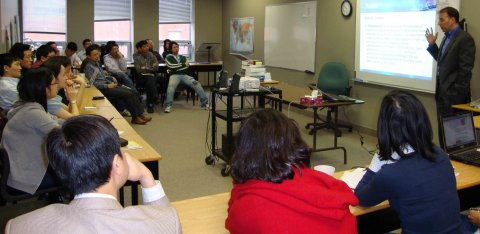
During courses at the Canadian universities, scholars, artists, researchers, entrepreneurs ... are often invited to class to talk to students. Dr. Ian Cavanagh, director of Ambir ICT, an IT business in Canada, the US and India were invited to talk about globalization. He said the best selling book in America in 2006, "The World is Flat" by Thomas Friedman had a great influence on his business strategy. Running a multinational corporation, Ian wanted to take the idea of "flat world" branding. But when searching on Google, domain named flatworld.com had a subscriber (although it has never been used for business purposes). He decided to buy this domain name. The first negotiation failed, some times later, too. Finally, Ian had to pay several thousand dollars for someone he never knew in Korea to buy the domain name flatworld.com. A Canadian and a South Korean across the Pacific Ocean, far apart over half the earth, they did not know each other but they were trading with sales agreement through a global network.
Dr. Ian Cavanagh opened talks with the story as above, to reaffirm: with the booming of the internet today, all individuals in every corner of the world have an equal opportunity to compete in a common playground, which is "flat world."
As an entrepreneur, but in the talk about culture, audiences fascinated with Ian’s approach. He said that if someone wants to do business successfully in an integrated world, they must penetrate cultures. With many years of working in different countries, Ian realized that, if the West are humorous and often outspoken, practical and assertive, the Asians are friendly, warm, adaptable, and easy to talk. For example, to participate in a workshop, with the West, if the time opening right at 8 o'clock, they will start exactly at 8 o’clock, even though there are some who may arrive late. Within one hour, they will be discussed in accordance with the scheduled program. And in an Asian country, if the conference is planned starting at 8 but only few people are there on time. 15 minutes later there are still some who come sporadically. 20 minutes later someone comes in and still there are some who do not come. The agenda can be flexible, instead of starting at 8 o’clock, it will be possible from half past 8 or 9 a.m. Instead of 1 hour meeting, it can last up to 3 hours (not according to the plan made in advance).
Westerners often express their views but some Asian countries they are not think so subtle. If you say the wrong in New York, they will tell you wrong. But in India, people can’t say you right or wrong. Ian said : “Indians is different from Vietnamese people. Vietnam is different from me and I am different from you”. Culture is a valuable asset, but also cultural differences. Ian said: "Vietnamese peoples are very kind, amiable, easy to cooperate. I appreciate the unique differences. More 90 million Vietnamese peoples are very smart, but how to succeed in business in the flat world is something that needs attention. Vietnamese peoples should get closer with Westerners by cultural and Westerners also try to understand Vietnamese peoples in the process integration. Ian believed that India, China, Brazil, Vietnam ...will be the center of economic integration in the future of the world. "
Flat world is in economy not in culture. Now, English is being considered as a means of communication in global trade. But why do you have to lose their culture when speaking English ? Voices is part of the cultural but it is not cultural. Ian said that Canadian have experience in Quebec. Previously they thought that if Quebec peoples do not speak French, it isn’t identity Quebec. But not so. Now, French and English coexist in the business, it do not eroded cultural identity. New Foundland province (easternmost Canada) do not have their own voice but retains a unique cultural heritage, it can’t be mixed.
Ian asked: “What's your name ?” . “ I'm Quang”. “You are Quang, not Tom or Jones. When speaking English, your name still is Quang. No one is calling you Tom or Jones. Quang is the name of your own. It is very inviolable. Some Asian immigrants called themselves by European name, it ’s easier to communicate, but I think, it is not good. Maybe they did lose something very own.
Ian told he has lived and worked in many countries, but he has always prided himself when he is Canadian. “You are proud to be Vietnamses and I am proud to be Canadian” – said Ian. When came back Canada from American, he cried: "This is my country, this is my home." Culture becomes something that ’s deeply personal. Ian said that he earned money from the global economy but he never loses his own culture.
Du Hong Quang